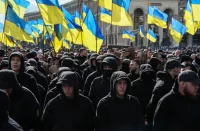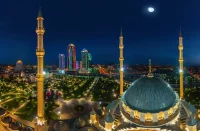Winston Churchill once said: “To jaw-jaw is always better than to war-war”, while his saying perfectly suits on the current conflict in/on the Syrian Arab Republic, where the war shredded the country and its social fabric, it seems no one has the magic wand to end the bloodshed in one of the safest places on earth before 2011. After the failure of peace talks in Geneva I & II conferences between the representatives of the Syrian government and the external opposition represented by the “National Coalition for Syrian Revolution and Opposition Forces” and the “Syrian National Council”, Russia proposed a new round of talks in Moscow, with an expanded opposition delegation which will include opposition figures from the internal opposition as well, namely “The Syrian National Coordination Body” (SNCB) beside other smaller parties, which was one of the demands of Damascus government. In order to unite their agenda, the opposition groups agreed in principle to sign a document of mutual understanding that states the formation of a transitional government with broader powers and the election of a president with two terms, each lasting only 4 years, in addition to implement a fast process of separating the Baath party from all state apparatuses during a three months period at most, and the abolition of all laws that are crippling liberties, in addition to allowing political and media work. Moreover, the declaration calls “all sides” to stop violence, and a necessity to issue a UN Security Council resolution to impose ceasefire, and to form Arab and International Peacekeeping Forces, as well as a resolution to ban the supply of arms to “all parties”. The document finally aims to establish a temporary military council that constitutes of officers from the Syrian army and the militants who believe in political solution and democratic transition. This council is subjected to the transitional government and its mission is confined to the leadership of the army during the transitional phase.
Nevertheless, despite the importance of democratic elections, trust building measures and dialogue, ending the bloodshed in Syria is conditioned with three important factors:

First, the demand to ban the supply of arms to “all parties” which includes the Syrian army is irrational and helps the terrorists at the very least. The only part that is effectively combating the terrorist organizations in Syria is the Syrian Army; therefore if the priority is to get rid of ISIS, Al-Nusra Front and other terrorist organizations, and pave the way to democratic transition, then the delegation of the opposition should change their behavior and support the Army in exchange to political concessions by the Damascus government.
Second, the anti-Assad camp needs to realize that fighting him and ISIS at the same is not a realistic policy and it has been proven to be counterproductive. Therefore, the negotiation process must be associated by solid pressure by the United States to force the egoistic leaders of Middle Eastern monarchies and the Turkish President Recep Pasha Erdogan to halt all kinds of financial, logistical and arm supplies to the militants in Syria, which usually ends up in the hands of ISIS terrorists and other affiliated groups. For example, a recent UN report concluded that Turkey has been one of the primary routes for weapons smuggling to ISIS and al-Nusra Front. “Most [arms] supplies have either been seized from the armed forces of Iraq or (to a lesser extent) the Syrian Arab Republic, or have been smuggled to ISIL and [al-Nusra], primarily by routes that run through Turkey,” said a report penned by the U.N. al-Qaida Sanctions Committee.
Third, despite the importance of the diplomatic track, this process should be in parallel with two important actions: (I) intelligence coordination is needed between the coalition and both Tehran and Damascus governments, any other argument that refuses to consolidate the anti-terrorism efforts is detached from reality on the ground and certainly not serious in defeating the ISIS phenomenon. The clichés of “moderate rebels”, “responsibility to protect”, “no fly zone” and “humanitarian corridors” will only aggravate the security situation in the Middle East and impose serious threats on the U.S. allies before any other state. (II) To launch a doctrinal reform among the exporters of the Wahhabi school of thought in the Middle East and central Asia which was one of the main reasons behind most of the

terrorist attacks in the area; look what the wahhabi schools (madrassas) did in Pakistan, where many of the Taliban terrorists graduated from these Saudi-financed madrassas which indoctrinated them with the ultra-extremist ideology of Wahhabism. Only three weeks ago, the pupils of these religious schools attacked a school in Pakistan and killed at least 141 people, including 132 children. It is time to stop this madness and treat the origins of the problem, if we didn’t stop the radicalization of the Muslim youths; we will witness more wars in the area within few years, much more brutal from the current one in Syria and Iraq. Hence, I believe any future solution between the different factions in Syria should impose a real secular system that enforces strict separation of the state from religious institutions and emphasize that all Syrians of different religions, sects and beliefs are equal before the law.
In conclusion, the war in Syria is in fact a war on Syria, where geopolitical interests intersected with the domestic demands, while some influential states intervened to secure their strategic interests, others aimed to reshape the balance of power in the area from the Syrian gate, but the security situation has reached a stage where in exception to Turkey and Saudi Arabia, most regional and international powers are looking for a dignified exit from the Syrian dilemma. However, the Syrian people are still waiting for answers to their legitimate questions : what will be the nature of the political system in Syria? What is the future of the shattered infrastructure (water, electricity, governmental institutions, etc)? Who will disarm and defeat the terrorist organizations? Are the so called opposition figures able to impose a ceasefire on the armed groups? Addressing these questions is essential to decide the fate of Syria’s sovereignty, security and democracy.
Kevork Almassian is a Syrian Political Researcher who currently lives and studies in Beirut, exclusively for ORIENTAL REVIEW.














Comments